
A year after its debut, the National Cancer Data Base (NCDB) began collecting data and would go on to become the world's largest clinical registry. A plastic surgeon in India performed the first face replant. The College elected its first African-American President.
1990
College Publishes 75th Anniversary History
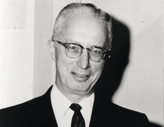
1990
College Publishes 75th Anniversary History



American College of Surgeons at 75, written by George W. Stephenson, MD, FACS, was published. Covering College activities from 1955 to 1988, Dr. Stephenson described this new book as a companion piece to Loyal Davis' Fellowship of Surgeons: A History of the American College of Surgeons, which was published in 1960.170 In addition to serving as the College's archivist from 1974–1998, Dr. Stephenson served the College in a variety of capacities for 48 years.171
Citations
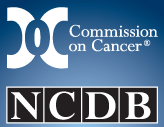
1990
NCDB Began Capturing Data
1990
NCDB Began Capturing Data

A year after its formation, the National Cancer Data Base (NCDB), a joint program of the American College of Surgeons and American Cancer Society, began capturing data from all Commission on Cancer hospital programs and subsequently became recognized as the largest clinical registry in the world (there are now more than 1,500 Commission-accredited cancer programs in the U.S. and Puerto Rico). Some 70 percent of all newly diagnosed cases of cancer in the U.S. are captured at the institutional level and reported to the NCDB. Today, the database contains about 26 million records from hospital cancer registries across the U.S.172
Citations
1993
The Fugitive Relies on Surgeon Consultant

1993
The Fugitive Relies on Surgeon Consultant

Bruce L. Gewertz, MD, FACS, surgeon-in-chief, chair of the department of surgery, vice president for Interventional Services and vice dean of academic affairs at Cedars-Sinai Health System, Los Angeles, provided script consultation and medical advisory services for the 1993 blockbuster film The Fugitive, starring Harrison Ford.173 He also had a small part in the film,174 which went on to gross nearly $354 million worldwide.175 The movie centered on Richard Kimble, MD, a fictional character who was wrongly accused of murdering his wife and escaped from prison to try and find the real killer.
Citations

1994
World's First Face Replant Performed
1994
World's First Face Replant Performed



Abraham George Thomas, MD, a plastic surgeon, conducted the first full-face replant operation on nine-year-old Sandeep Kaur, whose face and scalp were pulled off when her hair was caught in a thresher. Sandeep was brought to the Christian Medical College and Hospital in Ludhiana, India where Dr. Thomas, an experienced microsurgeon, spent 10 hours sewing on Sandeep's detached face and scalp.176 The operation was successful, although she was left with some muscle damage as well as scarring around the perimeter where the facial skin was sutured back on.
Citations
1994
Medical TV Drama "ER" Premieres
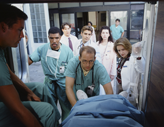
1994
Medical TV Drama "ER" Premieres
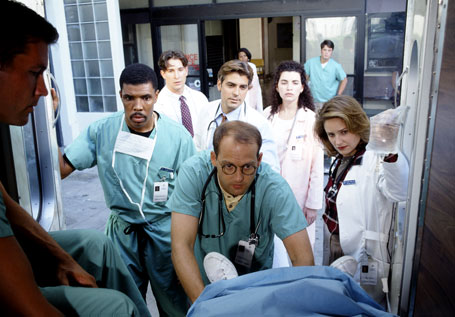
Set in the emergency room of fictional County General Hospital in Chicago, the TV series "ER" started a 15-year run on prime time television. The show followed the lives of the ER physicians, staff, and patients with most scenes set in the hospital or surrounding city streets. For the most part, the fictional show attempted to be realistic. One surgical highlight on the show was when a surgeon (Peter Benton, MD, fictional character) read the safe surgery checklist before initiating a patient's (John Carter, MD, fictional character) transplant surgery and saved the patient's life as a result.177 The day after that episode aired, 150 surgeons were gathered in New York to talk about safe surgery protocols; the organizers had them watch the entire episode.178
Citations
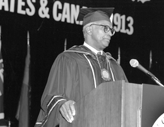
1995
College Elects First African-American President
1995
College Elects First African-American President

An oncology surgeon and educator, LaSalle D. Leffall, Jr., MD, FACS, of Washington, DC, became the College's first African-American President. Dr. Leffall, a long-time medical professor at Howard University, devoted his career to the study of cancer, especially among African Americans.179 Dr. Leffall's research focus helped him become the first African-American President of the American Cancer Society (1978-1979).180
Citations



